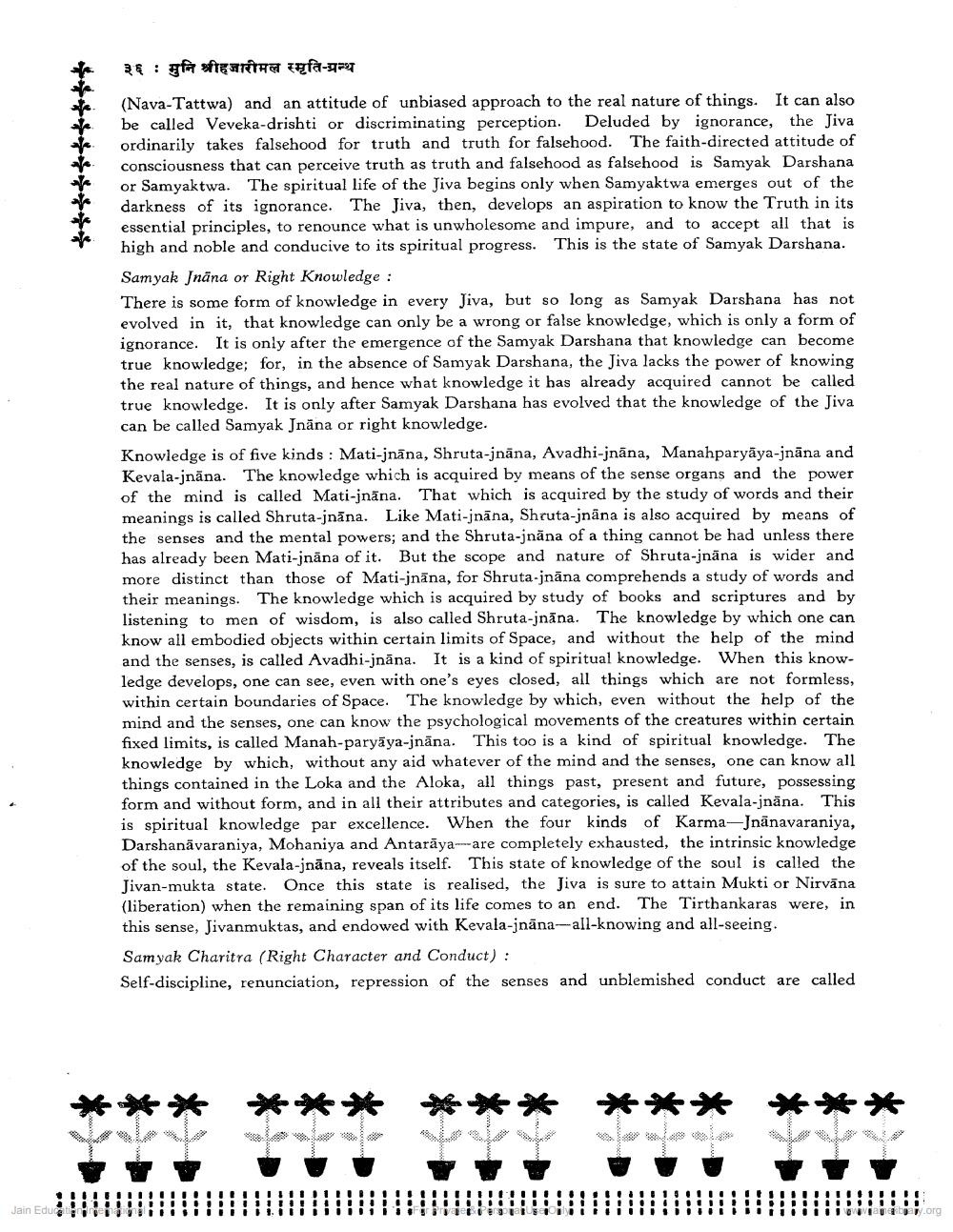Book Title: Doctrines of Jainism Author(s): K B Jindal Publisher: Z_Hajarimalmuni_Smruti_Granth_012040.pdf View full book textPage 7
________________ Jain Educ FFFFFFF+++ 11 ३६ : मुनि श्रीहजारीमल स्मृति ग्रन्थ (Nava-Tattwa) and an attitude of unbiased approach to the real nature of things. It can also be called Veveka-drishti or discriminating perception. Deluded by ignorance, the Jiva ordinarily takes falsehood for truth and truth for falsehood. The faith-directed attitude of consciousness that can perceive truth as truth and falsehood as falsehood is Samyak Darshana or Samyaktwa. The spiritual life of the Jiva begins only when Samyaktwa emerges out of the darkness of its ignorance. The Jiva, then, develops an aspiration to know the Truth in its essential principles, to renounce what is unwholesome and impure, and to accept all that is high and noble and conducive to its spiritual progress. This is the state of Samyak Darshana. Samyak Jnana or Right Knowledge: There is some form of knowledge in every Jiva, but so long as Samyak Darshana has not evolved in it, that knowledge can only be a wrong or false knowledge, which is only a form of ignorance. It is only after the emergence of the Samyak Darshana that knowledge can become true knowledge; for, in the absence of Samyak Darshana, the Jiva lacks the power of knowing the real nature of things, and hence what knowledge it has already acquired cannot be called true knowledge. It is only after Samyak Darshana has evolved that the knowledge of the Jiva can be called Samyak Jnana or right knowledge. Knowledge is of five kinds : Mati-jnana, Shruta-jnāna, Avadhi-jnāna, Manahparyāya-jnāna and Kevala-jnana. The knowledge which is acquired by means of the sense organs and the power of the mind is called Mati-jnana. That which is acquired by the study of words and their meanings is called Shruta-jnana. Like Mati-jnana, Shruta-jnana is also acquired by means of the senses and the mental powers; and the Shruta-jnana of a thing cannot be had unless there has already been Mati-jnana of it. But the scope and nature of Shruta-jnäna is wider and more distinct than those of Mati-jnana, for Shruta-jnana comprehends a study of words and their meanings. The knowledge which is acquired by study of books and scriptures and by listening to men of wisdom, is also called Shruta-jnana. The knowledge by which one can know all embodied objects within certain limits of Space, and without the help of the mind and the senses, is called Avadhi-jnana. It is a kind of spiritual knowledge. When this knowledge develops, one can see, even with one's eyes closed, all things which are not formless, within certain boundaries of Space. The knowledge by which, even without the help of the mind and the senses, one can know the psychological movements of the creatures within certain fixed limits, is called Manah-paryaya-jnana. This too is a kind of spiritual knowledge. The knowledge by which, without any aid whatever of the mind and the senses, one can know all things contained in the Loka and the Aloka, all things past, present and future, possessing form and without form, and in all their attributes and categories, is called Kevala-jnäna. This is spiritual knowledge par excellence. When the four kinds of Karma Jnänavaraniya, Darshanavaraniya, Mohaniya and Antaraya-are completely exhausted, the intrinsic knowledge of the soul, the Kevala-jnana, reveals itself. This state of knowledge of the soul is called the Jivan-mukta state. Once this state is realised, the Jiva is sure to attain Mukti or Nirvana (liberation) when the remaining span of its life comes to an end. The Tirthankaras were, in this sense, Jivanmuktas, and endowed with Kevala-jnana-all-knowing and all-seeing. Samyak Charitra (Right Character and Conduct): Self-discipline, renunciation, repression of the senses and unblemished conduct are called ** *** ** *** *** ***Page Navigation
1 ... 5 6 7 8 9 10 11 12 13 14 15
